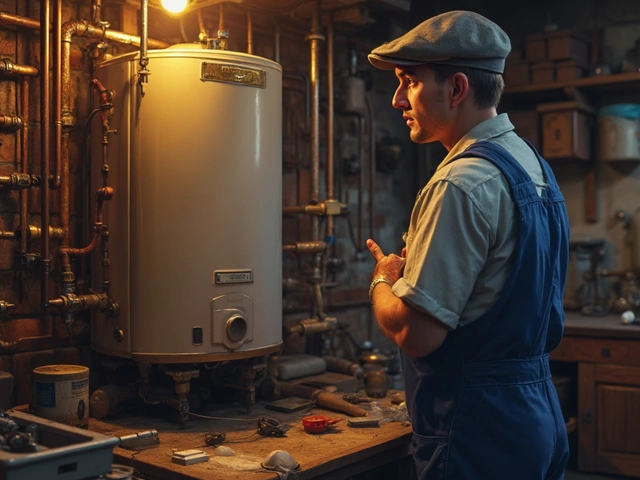Ever bought a shiny new fridge, only to watch it sputter and croak right after the warranty expired? We've all been there. What's the difference between a washer that grinds through a decade's worth of laundry and one that fizzles out after two years? The name stamped on the front might matter more than you think—and the data behind appliance lifespans is kind of shocking.
What Makes Some Appliance Brands Outlast Others?
The big secret isn't just about snazzy looks or smart features. When you dig into why certain brands trump others for longevity, it comes down to a mix of build quality, engineering, and yes—good old-fashioned reputation. Some companies are relentless about their quality control. Others have shifted gears, focusing on lower upfront prices, even if that means more breakdowns down the line. What most folks don't realize: those small savings up-front can cost you big when you're shelling out for repairs or early replacements.
One thing stands out in almost every independent report: Japanese and German brands lead the way for longevity, often by years. For example, a 2023 Consumer Reports survey found that brands like Miele, Bosch, and LG consistently outperform many American competitors, especially with washers and dishwashers. It comes down to simple math: companies obsessed with engineering stick around, while trend-obsessed brands tend to cut corners to compete on price.
Peer into the guts of a Miele washer and you'll find thick, sturdy parts—even the drum is weighed for balance. Compare that to budget models, where rubber belts wear out inside two years. With refrigerators, companies like Whirlpool and GE still deliver remarkable results, but only if you go for their higher-tier lines. Let’s get real—a $2,000 Sub-Zero isn’t just hype; those things claim a viable lifespan north of 20 years and people often pass down their fridges when moving house. That’s rare for most brands these days.
Ever notice some homes rock the same 30-year-old oven or washer with almost no fuss? Odds are it's a classic from a workhorse brand. Manufacturers with production lines in countries like Germany, Japan, and South Korea put an immense emphasis on testing for tens of thousands of cycles. They expect buyers to keep stuff for a generation, not just until the next Black Friday sale. The flip side: global brands that build across multiple factories tend to have more uneven results, since not every production plant hits the same quality standards. That's why you’ll sometimes hear vastly different experiences about the same brand.
If you ask repair techs what appliance brands they love, you’ll usually hear names like Speed Queen, Miele, and sometimes Bosch. Speed Queen is basically indestructible when it comes to laundry machines. They're made primarily for laundromats, but regular folks can buy them too—just don't expect fancy touchscreen controls. What you get is a washer or dryer that can actually last up to 25 years. It doesn’t break down because it doesn’t have the junk parts that wear out in modern, complicated machines.
The Appliance Brand Showdown: By Category
Not all appliance brands rule across the board. Some have killer washers, but their stoves are, frankly, junk. To see real winners, let's break it down by the biggest categories: washers and dryers, refrigerators, dishwashers, stoves/ovens, and microwaves.
For washing machines and dryers, hands down—Speed Queen crushes it for reliability. It's an industry inside joke: buy one, and you may never need another. They don’t even load their machines with features you’ll never use. If you crave fancy digital displays, you'll need to compromise a bit on longevity. LG is also a smart bet for washing machines, especially front-loaders. A 2024 Yale Appliance reliability report puts LG right at the top for lowest service rates in year one (just above 4%), and their machines often hit the 10-year mark without major drama.
Fridges are a bit more complicated. Whirlpool has a long-standing rep for durability, especially their simpler, top-freezer models. If you want luxury and ultra-long life, Sub-Zero and Miele own this space, but be ready for some sticker shock. Interestingly, GE often outruns Samsung and Whirlpool for side-by-side and French-door models in real-world use, although newer Samsung models get good marks for smart tech and style.
When it comes to dishwashers, Bosch has been cleaning up—literally—for years. Their dishwashers are known for lasting up to 15 years with regular use, and they rarely miss a beat. Miele is the only other brand that pushes into the 20-year territory, but their dishwashers cost a mint. Don’t want to spring for a German luxury brand? Try KitchenAid—solid build, easy parts, and good repairability.
Stoves and ovens? That’s a wild field. Whirlpool and GE both make long-living electric and gas models, but if you want to slam the door a thousand times and bake for a football team, go vintage. Some 30-year-old Kenmore ovens still broil like champs. For induction, Bosch and Miele shine, especially for consistent results and longevity.
Microwaves are more of a crapshoot. Panasonic's inverter models can quietly outlast the competition (with lifespans of 8-10 years for many users), but the truth is, most folks accept their microwave might last five or six years before the inevitable arcing or door failure. That being said, Sharp-built internals (sometimes rebranded) also get good grades for durability.
| Appliance Type | Top Long-Lasting Brand(s) | Expected Lifespan (years) | User Service Rate (% first year) |
|---|---|---|---|
| Washing Machine | Speed Queen, LG, Miele | 15–25 | Speed Queen <5, LG 4, Miele 5–7 |
| Dryer | Speed Queen | 15–25 | Speed Queen <5 |
| Refrigerator | Whirlpool, GE, Sub-Zero, Miele | 12–20+ | GE 7, Whirlpool 9, Sub-Zero 4 |
| Dishwasher | Bosch, Miele, KitchenAid | 12–20 | Bosch 5, Miele 5–7 |
| Oven/Stove | Whirlpool, GE, Bosch | 15–30 | Whirlpool 6, Bosch 7 |
| Microwave | Panasonic, Sharp | 6–10 | Panasonic 8 |

What the Appliance Industry Doesn’t Advertise
You’d expect manufacturers to brag about how long their stuff lasts, right? But the fact is, planned obsolescence is a well-oiled machine. Most appliance warranties cap at one year for a reason—they know exactly how long key parts are expected to last. What’s sneaky: many mid-tier appliances are now built with cheaper parts, even in brands that used to be bulletproof, just to keep costs down for big box stores.
Let’s get into numbers. A 2022 Yale Appliance report showed that more than 20% of modern refrigerators required service in the first five years. Dryers, especially ventless European models, have much lower breakdown rates, but washers—especially top-loaders without an agitator—can break more than you’d guess. Older appliances? Many had life expectancies in the 15-30 year zone. Modern ones? About 7–12 years for most, with some exceptions if you pony up for premium lines.
Another surprise is just how much of a lottery parts sourcing can be. A familiar brand might source a particular part from the cheapest supplier that year, so the model you get in 2025 could differ wildly from the one your neighbor bought in 2020, even with the same badge on the front. That’s why digging into precise model reviews—down to the SKU—isn’t just nerdy, it’s practical if you want something that lasts.
Here’s a kicker: appliance techs often say it’s not uncommon for ‘luxury’ brands to charge hundreds for basic repairs because parts are proprietary. Ordinary brands sometimes use universal components, making repairs easier and cheaper. So if you're thinking about going high-end, check if local techs actually service your brand and what parts typically cost before spending big.
Tips for Getting the Most Out of Your Appliances
Even the tankiest washer will croak fast if you run it wrong. Sometimes lifespan isn’t just about the badge—it’s how you take care of stuff. Here’s what actually matters, and not just according to the manufacturer’s pamphlet.
- Don’t overload. Cramming your washer or dishwasher means everything works harder, and that chews up the lifespan faster than you’d guess.
- Maintenance beats repairs. A simple monthly vinegar rinse can prevent grimy buildup in washers. Cleaning dryer lint screens—in the duct, not just the tray—is the number one move for avoiding breakdowns and fire risk.
- Use real parts. Cheap off-brand replacement parts from the internet are tempting but often don’t last long. Order parts from an authorized dealer.
- Keep it clean. Refrigerators need the coils dusted off every six months (yeah, nobody does this, but it can add years). For ovens, use the self-clean cycle only if the manual recommends it—overdoing it can fry the electronics.
- Watch water. Hard water wrecks dishwashers and washing machines. Install a water softener if your area is known for hard water deposits.
- Don’t ignore warning signs. Any weird noise, burning smell, or light flickering isn’t normal! Catching these early prevents catastrophic breakdowns.
If you’re torn between a basic model and a feature-packed marvel, keep this in mind: every extra gadget, sensor, or touch display is just one more thing that can break. The old-school mechanical dial might not text you when your jeans are dry, but it could outlive three generations of touchscreen machines.

Making Your Pick: Paying for Years, Not Just Features
Let’s be real—no one wants to buy new appliances every five years if they can help it. So, what’s the smartest move? Arm yourself with some reliable names: Speed Queen for washers and dryers, Bosch for dishwashers, Whirlpool and GE for fridges (especially on simpler models), and maybe Sub-Zero if you want the kitchen to outlive you. For stoves and ovens, stick with classic, well-reviewed models from established brands like Whirlpool, GE, or Bosch.
Here’s a tip: Check actual repair shop recommendations in your city. Every area has its own climate and quirks, which can impact how long your appliances last. What works great in dry Arizona heat might be a dud in a Florida beach house. If you're buying new, don’t just trust the brand—look up the exact model for customer feedback in the past 3 years. Don’t be shy about hunting down serial numbers and combing through reviews; it pays off.
If you’re shopping used or vintage, sometimes the older models from Kenmore, Maytag, or Whirlpool outlast new ones. Even old GE stoves are a gold mine on the secondhand market. Just verify service history and make sure you can still get parts.
Bottom line? The longest lasting appliances are usually hiding in plain sight. Familiar brands, basic features, and a little common sense in maintenance go a long way. Resist the urge to jump on every trend, and you could have a kitchen that works just as well twenty years from now. Now, isn’t that a pretty good investment?







